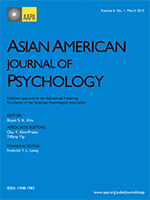July 31, 2015
The Executive Committee of the Asian American Psychological Association (AAPA), on behalf of the AAPA, wishes to express our sadness and dismay upon reviewing the American Psychological Association (APA)’s Report of the Independent Review Relating to Ethics Guidelines, National Security Interrogations, and Torture.
This is not the first time in the history of our nation or of our profession that foundational understandings and guidelines for legal, ethical, or moral behavior have been ignored or overturned. The current situation raises echoes for us of a dark chapter in American history during World War II when – under the guise of a national security threat – over 110,000 Japanese Americans, two-thirds of whom were U.S. citizens, were imprisoned in concentration camps and denied their rights, essentially setting aside the United States Constitution. We are heartened that, unlike the experience of Japanese Americans, it did not take four decades to investigate the events and begin the process of prioritizing ethical and just processes and practices.
Although AAPA is a separate organization from APA, we recognize that the actions of APA, as the largest professional organization of psychologists, reflect on the public’s perception of psychology and psychologists more generally. Consequently AAPA, as an independent organization of psychologists, would like to voice our stance on ethical issues even as we recognize that it is up to APA and its governance to address the specific findings and shortcomings.
The AAPA condemns torture or abuse of any person, for any reason, including interrogation. As psychologists our goal is to heal, not to harm. Furthermore, we believe that ethical guidelines for psychologists should make clear the unacceptability of such practices and should be shaped by an ongoing dialogue within the profession about the meaning of “torture” and “abuse.”
As an association founded to address inequities within the field of psychology, we are disturbed by findings described in the report that suggest that the APA’s governing processes, policies, ethical guidelines, reports, and public statements were used to support or justify the development or application of oppressive or harmful practices. We are also disturbed by findings that the development of these processes and policies was influenced strongly by external bodies (e.g., the Department of Defense) and political agendas. The report further indicates that much of this influence was clandestine. Furthermore, we are deeply concerned by descriptions in the report that suggested that APA generally, and the Ethics Office specifically, prioritized advancing the economic and standing interests of the discipline and member psychologists, rather than the well being of the people and communities whom psychologists serve.
As a psychological association dedicated to addressing inequities and promoting health for all people, but particularly those historically marginalized, we assert that psychologists and psychological associations have the responsibility to prioritize beneficence to others above personal or professional advancement. Furthermore, we assert that ethical guidelines for psychologists generally, and in any specific association, should be guided by the standards of the field as developed by those with expertise in the field, through public and transparent dialogues and processes.
The findings of the Independent Review indicate that the APA moved alarmingly away from its mission to “advance the creation, communication, and application of psychological knowledge to benefit society and improve people’s lives” and its vision to be “an effective champion of the application of psychology to promote human rights, health, well being and dignity.”
We call on APA to acknowledge past errors, and engage in revising guidelines, policies, processes, and organizational culture to more fully and deliberately embrace the values and priorities above. We urge APA to develop a process that is open and transparent in order to create purposeful and sustainable change to psychology’s engagement with ethics in general and in specific relation to military involvement and torture. Furthermore, we urge the APA to shape a process that includes the multiple perspectives and diverse professional expertise of all psychologists. All psychologists, regardless of APA membership, have a stake in a common goal of individual and societal health.
Finally, we call on AAPA members and all psychologists to actively participate in rebuilding public trust in us and in our profession. There should be no doubt that our research and practice of psychology advance and promote individual, social, and systemic understanding, psychological health, well being, and justice.





